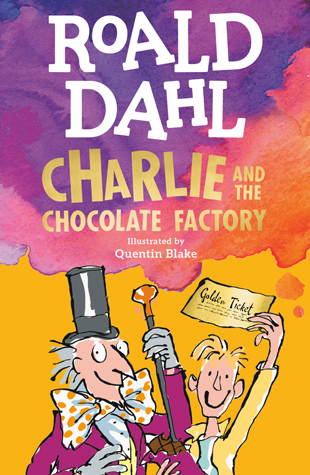Jayson's Reviews > Charlie and the Chocolate Factory
Charlie and the Chocolate Factory (Charlie Bucket, #1)
by

by

Jayson's review
bookshelves: read-in-2025, 100-199-pp, author-british, ebook-overdrive, era-cold-war, format-illustrated, genre-childrens, genre-juvenile-fantasy, z-saturday
Dec 18, 2024
bookshelves: read-in-2025, 100-199-pp, author-british, ebook-overdrive, era-cold-war, format-illustrated, genre-childrens, genre-juvenile-fantasy, z-saturday
(A-) 84% | Very Good
Notes: All whimsy, vim, if pretty Grimm, on getting just desserts, where self-control's a safety goal and manners never hurt.
*Check out progress updates for detailed commentary: (view spoiler)
Notes: All whimsy, vim, if pretty Grimm, on getting just desserts, where self-control's a safety goal and manners never hurt.
*Check out progress updates for detailed commentary: (view spoiler)
Sign into Goodreads to see if any of your friends have read
Charlie and the Chocolate Factory.
Sign In »
Reading Progress
December 18, 2024
– Shelved
December 18, 2024
– Shelved as:
to-read
December 18, 2024
– Shelved as:
read-in-2025
December 18, 2024
– Shelved as:
100-199-pp
December 18, 2024
– Shelved as:
author-british
December 18, 2024
– Shelved as:
ebook-overdrive
December 18, 2024
– Shelved as:
era-cold-war
December 18, 2024
– Shelved as:
format-illustrated
December 18, 2024
– Shelved as:
genre-childrens
December 18, 2024
– Shelved as:
genre-juvenile-fantasy
January 11, 2025
–
0.0%
"
Notes:
(1) One of my yearly reading goals is to finish at least one "household name" novel.
- I don't mean the YA novel de jour practically no one outside Goodreads has even heard of. I mean a novel pretty much everyone's heard of.
- For various reasons, everyone's heard of this book.
(2) I've never seen either film, nor any adaptation, so this will be completely new to me."

Notes:
(1) One of my yearly reading goals is to finish at least one "household name" novel.
- I don't mean the YA novel de jour practically no one outside Goodreads has even heard of. I mean a novel pretty much everyone's heard of.
- For various reasons, everyone's heard of this book.
(2) I've never seen either film, nor any adaptation, so this will be completely new to me."
January 12, 2025
–
Started Reading
January 14, 2025
–
36.0%
"
Notes:
(1) For Charlie, unlike the other children, buying chocolate bars expressly to find a Golden Ticket didn't work. It was only when he was at the point of starvation and bought the chocolate for food did he ultimately find one.
- It's a double-whammy, conflating our good feeling about him finally finding a ticket with him overcoming starvation.
(Continued in comments)"

Notes:
(1) For Charlie, unlike the other children, buying chocolate bars expressly to find a Golden Ticket didn't work. It was only when he was at the point of starvation and bought the chocolate for food did he ultimately find one.
- It's a double-whammy, conflating our good feeling about him finally finding a ticket with him overcoming starvation.
(Continued in comments)"
January 15, 2025
–
62.0%
"
Notes:
(1) "'Are the Oompa-Loompas really joking, Grandpa?' asked Charlie. 'Of course they're joking,' answered Grandpa Joe. 'They must be joking. At least, I hope they're joking. Don’t you?'"
- Grandpa Joe's "I hope they're joking" signals that they may not be. It casts an ominous sliver of doubt over the Oompa-Loompas and by extension Willy Wonka.
(Continued in comments)"

Notes:
(1) "'Are the Oompa-Loompas really joking, Grandpa?' asked Charlie. 'Of course they're joking,' answered Grandpa Joe. 'They must be joking. At least, I hope they're joking. Don’t you?'"
- Grandpa Joe's "I hope they're joking" signals that they may not be. It casts an ominous sliver of doubt over the Oompa-Loompas and by extension Willy Wonka.
(Continued in comments)"
January 15, 2025
–
Finished Reading
January 16, 2025
–
90.0%
"
Notes:
(1) The Oompa-Loompas get drunk on butterscotch and buttergin.
- Predictable, really. They're quite literally lightweights.
- Makes me wonder if Hogwarts students regularly get drunk on butterbeer.
- This story's definitely got Grimm sensibilities. Outright drunkenness or alcoholism isn't something you really see in modern children's fiction.
(Continued in comments)"

Notes:
(1) The Oompa-Loompas get drunk on butterscotch and buttergin.
- Predictable, really. They're quite literally lightweights.
- Makes me wonder if Hogwarts students regularly get drunk on butterbeer.
- This story's definitely got Grimm sensibilities. Outright drunkenness or alcoholism isn't something you really see in modern children's fiction.
(Continued in comments)"
January 21, 2025
– Shelved as:
z-saturday
Comments Showing 1-4 of 4 (4 new)
date newest »
newest »
 newest »
newest »
message 1:
by
JW
(new)
-
added it
Jan 18, 2025 09:20AM
 One of my childhood favorites. Your review made me so nostalgic. It’s obvious that reading it as an adult reveals layers that were missed as a kid. Great review!
One of my childhood favorites. Your review made me so nostalgic. It’s obvious that reading it as an adult reveals layers that were missed as a kid. Great review!
reply
|
flag
 JW wrote: "One of my childhood favorites. Your review made me so nostalgic. It’s obvious that reading it as an adult reveals layers that were missed as a kid. Great review!"
JW wrote: "One of my childhood favorites. Your review made me so nostalgic. It’s obvious that reading it as an adult reveals layers that were missed as a kid. Great review!"Thanks, JW! Happy you enjoyed it! Unfortunately, the film was before my time and so I never experienced it as a kid nor was I any sort of reader growing up and never read the book either. You're definitely right about the book having layers, I think it's one of those stories that hits kids and adults very differently :)



